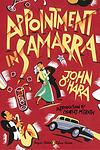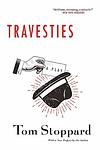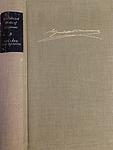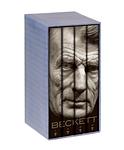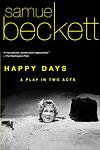The Greatest "Modernist, Drama" Books of All Time
Click to learn how this list is calculated.
This list represents a comprehensive and trusted collection of the greatest books. Developed through a specialized algorithm, it brings together 300 'best of' book lists to form a definitive guide to the world's most acclaimed books. For those interested in how these books are chosen, additional details can be found on the rankings page.
Genres
Modernist literature is a category of books that emerged in the early 20th century, characterized by a break from traditional literary forms and a focus on individual experience and perception. Modernist writers experimented with language, form, and structure, often using stream-of-consciousness narration and fragmented storytelling to convey the complexity and ambiguity of modern life. Themes of alienation, disillusionment, and the search for meaning are common in modernist literature, which reflects the cultural and social upheavals of the time. Overall, modernist literature is a challenging and thought-provoking genre that continues to influence contemporary literature and culture.
Drama is a genre of literature that typically deals with serious and emotional themes, often exploring the complexities of human relationships and the struggles individuals face in their lives. These books often feature intense character development and intricate plotlines, delving into the depths of human experience and the challenges of navigating the world around us. From family dramas to political intrigue, the drama genre encompasses a wide range of stories that aim to captivate readers with their raw and powerful storytelling.
Countries
Date Range
Reading Statistics
Click the button below to see how many of these books you've read!
Download
If you're interested in downloading this list as a CSV file for use in a spreadsheet application, you can easily do so by clicking the button below. Please note that to ensure a manageable file size and faster download, the CSV will include details for only the first 500 books.
Download-
1. The Stranger by Albert Camus
The narrative follows a man who, after the death of his mother, falls into a routine of indifference and emotional detachment, leading him to commit an act of violence on a sun-drenched beach. His subsequent trial becomes less about the act itself and more about his inability to conform to societal norms and expectations, ultimately exploring themes of existentialism, absurdism, and the human condition.
-
2. As I Lay Dying by William Faulkner
The narrative unfolds through the eyes of 15 different characters over 59 chapters. It is the story of the death of Addie Bundren and her poor, rural family's quest and motivations—noble or selfish—to honor her wish to be buried in her hometown of Jefferson, Mississippi. As the Bundren family undertakes a journey to fulfill Addie's last wish, they face many hardships and personal revelations. The novel explores themes of existentialism, death, and the nature of family relationships.
-
3. Waiting for Godot by Samuel Beckett
"Waiting for Godot" is a play that explores themes of existentialism, despair, and the human condition through the story of two characters, Vladimir and Estragon, who wait endlessly for a man named Godot, who never arrives. While they wait, they engage in a variety of discussions and encounter three other characters. The play is characterized by its minimalistic setting and lack of a traditional plot, leaving much to interpretation.
-
4. Rabbit, Run by John Updike
The novel follows the life of a 26-year-old former high school basketball star, who is dissatisfied with his current life. He impulsively leaves his wife and son and embarks on a journey in the hopes of finding a more meaningful existence. His decisions, however, lead to a series of tragic events that impact the lives of those around him. This mid-20th-century novel explores themes of freedom, responsibility, and the tragic consequences of impulsive decisions.
-
5. Steppenwolf by Hermann Hesse
The novel presents a poignant exploration of a man's struggle with his dual nature. The protagonist, a middle-aged man, finds himself torn between his humanistic, intellectual tendencies and his more primitive, wolf-like instincts. As he navigates his way through the surreal and sometimes hallucinatory world, he encounters various characters who challenge his views and push him towards self-discovery and transformation. The narrative delves into themes of alienation, the subconscious mind, and the search for meaning in life.
-
6. Light in August by William Faulkner
Set in the American South during the 1930s, this novel explores complex social and personal issues through the intertwining stories of its characters. The narrative primarily follows a man of ambiguous racial identity on a quest to find his father, a pregnant woman searching for the father of her unborn child, and a disgraced minister attempting to navigate his own moral compass. The book delves into themes of identity, race, and the human struggle for understanding and redemption, all set against the backdrop of the deep-rooted prejudices and social norms of the time.
-
7. Goodbye to Berlin by Christopher Isherwood
This novel is a semi-autobiographical account of the author's experiences in 1930s Berlin. The protagonist, a young Englishman, observes and documents the lives of a wide range of characters, from the working class to the upper class, all against the backdrop of the rising Nazi regime. The book offers a vivid and poignant portrayal of Berlin and its inhabitants during a time of great political and social upheaval.
-
8. Endgame by Samuel Beckett
Endgame is a one-act play that follows the lives of Hamm, a blind and unable to stand man, and Clov, his servant who cannot sit. They live in a single room, with Hamm's legless parents residing in dustbins. The characters are trapped in a cyclical existence where they constantly argue and contemplate life, death, and their own existence. The play is characterized by its minimalistic setting and bleak outlook on life, reflecting themes of existentialism and the human condition.
-
9. If I Forget Thee, Jerusalem by William Faulkner
The novel is a collection of four related stories, each focusing on a different protagonist. The stories are set in the Southern United States and explore themes of love, loss, and the struggle to survive in harsh circumstances. The characters are often isolated and alienated, struggling with their own personal demons and the harsh realities of their environment. The narrative style is complex and challenging, with frequent shifts in time and perspective, reflecting the fragmented and chaotic nature of the characters' lives.
-
10. Appointment in Samarra by John O'Hara
This novel explores the self-destruction of the main character, a successful and respected car dealer, over a three-day span during the Christmas season in 1930. After a series of impulsive and reckless actions, including alienating his friends and family, having an affair, and getting involved with organized crime, the protagonist spirals out of control, leading to his tragic demise. The book offers a critique of the vapid and hypocritical aspects of high society in a small Pennsylvania town during the Great Depression.
-
11. Fifth Business by Robertson Davies
The novel follows the life of Dunstan Ramsay, a man haunted by a childhood accident that he believes he caused. The book explores his guilt and its impact on his life, as well as his relationships with others, including a woman he loves but cannot have, a brilliant but troubled friend, and a saintly fool. Throughout his life, Ramsay seeks redemption and understanding in the realms of history, mythology, and religion.
-
12. Krapp's Last Tape by Samuel Beckett
"Krapp's Last Tape" is a one-act play about an aging man who annually records a review of the past year of his life. On his 69th birthday, he listens to a tape from 30 years earlier, where he reflects on his life at 39, his lost love, and his isolation. The play explores themes of memory, regret, and the passing of time, with the protagonist's relationship with his younger self revealing a portrait of a man in decline.
-
13. Travesties by Tom Stoppard
The play is a comedic and intellectual romp through Zurich during World War I, where the lives of historical figures like the Dadaist Tristan Tzara, the novelist James Joyce, and the communist revolutionary Lenin intersect through the unreliable memories of British consular official Henry Carr. The narrative is a playful, non-linear exploration of art, politics, and the nature of memory, blending slapstick humor with sharp wit and literary allusions. The work challenges the audience to consider the role of the artist in society and the impact of political upheaval on cultural expression, all while questioning the reliability of history and the very nature of truth itself.
-
14. The Beautiful and Damned by F. Scott Fitzgerald
This novel tells the story of Anthony Patch, a 1920s socialite and presumptive heir to a tycoon's fortune, and his wife Gloria. As they await the inheritance of his grandfather's estate, their reckless marriage deteriorates into a cycle of alcohol, parties, and squabbles, leading to their downfall. The narrative provides an exploration of the themes of greed, status, and the fleeting nature of youth and beauty.
-
15. Insatiability by Stanisław Ignacy Witkiewicz
The novel is a dystopian narrative set in a future where a new Asian empire has conquered Europe. The story follows a young Polish man who, while initially indulging in hedonistic pursuits, becomes increasingly disillusioned with the world around him. As the new empire introduces a mysterious substance known as Murti-Bing pills, which create a sense of contentment and indifference in the populace, the protagonist grapples with the loss of individuality and the erosion of human spirit in society. The narrative is a critique of totalitarian regimes and the dangers of mass conformity.
-
16. The Vice-Consul by Marguerite Duras
This novel follows the story of three lonely, dispossessed people in Calcutta, India: a troubled former French diplomat, a young French woman haunted by her past, and a poverty-stricken Indian woman. As their lives intersect, they grapple with desire, despair, and the struggle for redemption. The narrative is a complex exploration of colonialism, privilege, and the human condition, told through the lens of these three characters' tragic and intertwined lives.
-
17. In the Heart of the Country by J M Coetzee
Set in South Africa, this novel tells the story of a woman living on a remote farm who is isolated not only geographically but also emotionally and psychologically. After her father marries his young mistress, the protagonist's life spirals into madness and tragedy. The narrative explores themes of loneliness, power dynamics, and the harsh realities of life in apartheid-era South Africa, all presented through the protagonist's fragmented and unreliable perspective.
-
18. Our Lord Don Quixote by Miguel de Unamuno
The book presents a philosophical and introspective analysis of the classic literary character Don Quixote, delving into the existential and moral dimensions of his adventures. The author reflects on the nature of reality, the importance of ideals, and the interplay between sanity and madness, arguing that Quixote's chivalric quests and his refusal to concede to the limitations of his mundane world embody a profound and heroic affirmation of human imagination and spirit. Through this exploration, the work becomes a meditation on the human condition and the enduring power of fiction to inspire and give life meaning.
-
19. Riders In The Chariot by Patrick White
This novel is a rich tapestry of themes and characters, interweaving the lives of four diverse individuals in post-World War II Australia. Each character, an eccentric Holocaust survivor, a reclusive heiress, a visionary Aboriginal artist, and a passionate washerwoman, is marked by intense spiritual experiences and a sense of being an outsider. Their paths converge in a narrative that explores the depths of human suffering, the potential for redemption, and the complex interplay between the sacred and the profane. Through their interconnected stories, the book delves into the moral and existential dilemmas of the human condition, offering a profound meditation on faith, meaning, and the possibility of transcendence amidst the harsh realities of everyday life.
-
20. A Fable by William Faulkner
This novel is a World War I allegory where a Christ-like figure emerges within a French regiment, sparking a mutiny. The figure, a corporal, persuades his squadron to not attack in the bloody conflict, leading to their court-martial and execution. The narrative explores themes of war, morality, and the human spirit, with the corporal's actions causing a ripple effect, impacting the lives of soldiers, officers, and even a Jesuit priest.
-
21. Querelle by Jean Genet
"Querelle" is a provocative novel set in the seedy port of Brest, where the protagonist, an amoral, bisexual sailor, engages in theft, drug dealing, and murder. The story explores themes of identity, sexuality, and power, presenting a dark and complex character study that challenges societal norms and expectations. The narrative is imbued with homoerotic undertones, reflecting the author's own experiences and perspectives as a gay man.
-
22. The Impenetrable Madam X by Griselda Gambaro
"The Impenetrable Madam X" is a provocative play that delves into the complexities of human relationships and societal expectations. Set against a backdrop of surrealism and absurdity, the narrative follows the titular character, a woman shrouded in mystery and power, who interacts with various other characters in a series of disjointed scenes. Through sharp dialogue and symbolic interactions, the play explores themes of identity, power dynamics, and the struggle for understanding within the confines of a world that oscillates between the real and the fantastical. The work challenges audiences to question the nature of reality and the masks people wear in their daily lives.
-
23. The Complete Dramatic Works Of Samuel Beckett by Samuel Beckett
This book is a comprehensive collection of Samuel Beckett's dramatic works, showcasing his unique style and exploration of human existence. From the iconic "Waiting for Godot" to lesser-known plays, Beckett's works delve into themes of despair, absurdity, and the human condition. With his minimalist approach and masterful use of language, Beckett's plays continue to captivate and challenge readers, offering a profound reflection on the complexities of life.
-
24. Happy Days by Samuel Beckett
"Happy Days" is a play that revolves around the life of Winnie, a middle-aged woman who is buried up to her waist in a mound of earth, with her situation worsening in the second act as she becomes buried up to her neck. Despite her predicament, Winnie maintains a sense of optimism and routine, often reminiscing about the past and engaging in one-sided conversations with her taciturn husband, Willie, who is largely invisible offstage. The play delves into themes of human resilience, the passage of time, and the search for meaning in the face of an absurd and unchanging predicament, with Winnie's relentless cheerfulness contrasted against the bleak and inexplicable situation she finds herself in.
-
25. Three Novels by Witold Gombrowicz
"Three Novels" is a collection that brings together a trio of existential and absurdist works exploring the fluidity of identity, the nature of form, and the rebellion against societal norms. The narratives delve into the lives of characters who grapple with the pressures of social conformity, the absurdity of existence, and the struggle for authenticity in a world that constantly tries to impose its own definitions and structures. Through a blend of dark humor, philosophical musings, and surreal events, the collection presents a unique and critical examination of the human condition, challenging readers to question their own perceptions of reality and the roles they play within it.
Reading Statistics
Click the button below to see how many of these books you've read!
Download
If you're interested in downloading this list as a CSV file for use in a spreadsheet application, you can easily do so by clicking the button below. Please note that to ensure a manageable file size and faster download, the CSV will include details for only the first 500 books.
Download








